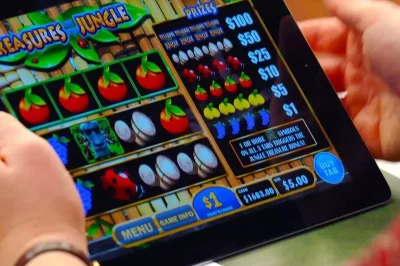 Minnesota’s legislature passed a new tax bill containing a provision that imposes restrictions on electronic pull-tab games at restaurants, bars, and similar venues. The machines, which are basically digital versions of paper pull-tab tickets, were originally introduced in 2012. The state government legalized them to help fund the construction of the Vikings Stadium in downtown Minneapolis. Electronic pull-tabs have become a major source of revenue for the state since their introduction, generating as much as $6.3 million per day. They resemble slot machines in a way but rather than using a random number generator, they have predetermined outcomes similarly to their printed counterparts.
Minnesota’s legislature passed a new tax bill containing a provision that imposes restrictions on electronic pull-tab games at restaurants, bars, and similar venues. The machines, which are basically digital versions of paper pull-tab tickets, were originally introduced in 2012. The state government legalized them to help fund the construction of the Vikings Stadium in downtown Minneapolis. Electronic pull-tabs have become a major source of revenue for the state since their introduction, generating as much as $6.3 million per day. They resemble slot machines in a way but rather than using a random number generator, they have predetermined outcomes similarly to their printed counterparts.
Electronic pull-tabs paid for the stadium’s construction and poured billions into the North Star State’s coffers but the latest move of the legislature could put an end to their exponential growth. When electronic pull-tabs first appeared in Minnesota, the state government had agreed with tribal gambling operators that the games would not imitate the way slot machines play. For clarification, tribal nations hold the exclusive rights to operate blackjack tables and slot machines in Minnesota.
The trouble is many electronic pull-tab games feel and play similarly to slot machines. Lawmakers decided to draw a clearer line between the two by prohibiting the ‘open-all’ feature incorporated into e-pull tabs. Said feature enables players to reveal an entire row of animated symbols with a single touch rather than opening them one by one. Players also stand the chance of winning bonus rounds, which is another uncanny resemblance e-pull tabs bear to slot machines.
Removing the ‘Open-All’ Feature Could Prove Detrimental for Charities, Backers Argue
 E-pull tab backers oppose the move, arguing that the ‘open-all’ functionality is one of the most attractive features of these lottery-style games. Removing it could prove a major setback for charities across the state that operate these Class II games. State legislation requires e-pull tabs to yield a long-term theoretical return of at least 85%, with the larger portion of the revenue going toward various charities. The venues hosting the games collect a smaller percentage of the proceeds. The machines generated more than $1.9 billion last year, with $270 million going toward the state coffers, as opposed to their printed counterparts, which generated $306 million in total.
E-pull tab backers oppose the move, arguing that the ‘open-all’ functionality is one of the most attractive features of these lottery-style games. Removing it could prove a major setback for charities across the state that operate these Class II games. State legislation requires e-pull tabs to yield a long-term theoretical return of at least 85%, with the larger portion of the revenue going toward various charities. The venues hosting the games collect a smaller percentage of the proceeds. The machines generated more than $1.9 billion last year, with $270 million going toward the state coffers, as opposed to their printed counterparts, which generated $306 million in total.
Proponents of the electronic pull-tabs insist the games keep the traditional charitable gaming industry in the state alive. They are mostly enjoyed by younger people and female players. The backers argue that pull-tabs differ from conventional slot machines because unlike the latter, the former allow you to socialize and offer significantly lower prizes amounting to a few hundred dollars. Proponents compare the removal of the ‘open-all’ feature to entering a multi-digit security code on your smartphone instead of instantly unlocking it with facial or fingerprint recognition. They fear people would lose interest, and these concerns are not entirely unfounded.
Experts reckon the removal of the ‘open-all’ feature could cause a 5% to 20% decline in e-tab gaming but for now, it is impossible to make firm predictions. The existing electronic pull-tabs will be grandfathered in until they are gradually replaced over the next year or so. Newly manufactured pull-tab machines will not offer the faster-play feature.